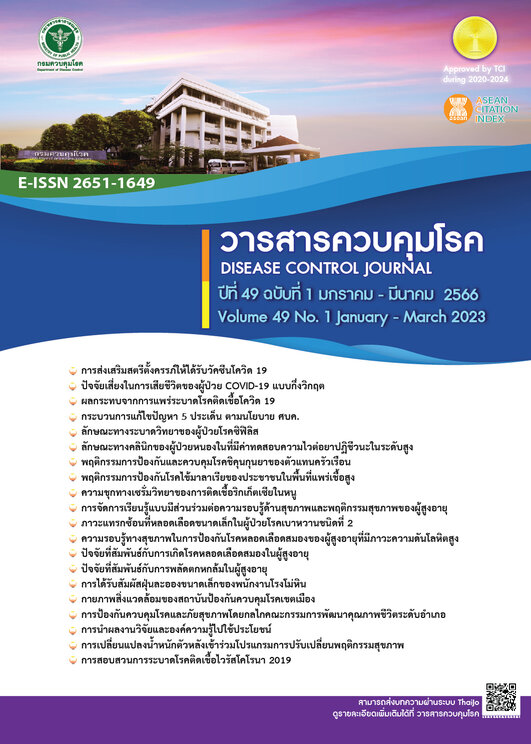Changes in body weight after attending a 7-week behavior modification program: the case study of personnel in the Department of Disease Control
DOI:
https://doi.org/10.14456/dcj.2023.19Keywords:
weight control program, BMI, workplace, applicationAbstract
This report aims to assess changes in body weight of a group of personnel after attending the 7-week behavior modification program with a new normal approach in the midst of the global COVID-19 pandemic. A quasi-experiment, one-group pretest-posttest design was used to collect data of an experimental group with non-randomized selection and no control group. Weight and height data of the voluntary participants from the Department of Disease Control were collected before the workshop and seven weeks after the completion of the training during September to October 2020 by self-recording on the ThaiSook Mobile Application. The data was analyzed together with the information from online questionnaire at the end of the program. Descriptive statistics were utilized to analyze mean, rate of change, and frequency. Inferential statistics, i.e. Paired Samples t-test, was conducted to compare the weight differences of the participants before and after the program. The results of the study showed that the program was able to track the weight of 54 out of 137 participants throughout the program. Of these 54 participants, 72.2% had weight loss, 18.5 % had unchanged body weight, and 9.2 % had weight gain. Overall, the proportion of people with normal Body Mass Index (BMI) increased from 14.8 to 22.2 percent. A subgroup analysis of those with normal to very obese BMI found that the average weight loss was 1.4 kg per person, accounting for a 2.0 percent reduction in average body weight per person. Using the t-test matched relationship, it was found that there was a statistically significant difference in the mean body weight of the participants before and after 7 weeks. The expenditure was THB 1,280 per participant. This study suggests that the distance learning combined with data tracking by mobile application is applicable and practical for implementing a behavior modification program. For the period of 7 weeks, the participants had achieved weight loss with statistical significance.
Downloads
References
Karnjanapiboonwong A, Kamwangsanga P, Kaewtha S, Editors. Situation report on NCDs: Diabetes, Hypertension and related risk factors Year 2019. 1st Edition. Nonthaburi: Department of Disease Control, Division of Non-Communicable Diseases; 2020. (in Thai)
World Health Organization. Overview of Noncommunicable diseases. [Internet]. [cited 2022 Jan 12]. Available from: https://www.who.int/health-topics/noncommunicable-diseases#tab=tab_1
Division of Human Resource Management, Department of Disease Control (TH). The Staff Health Survey Fiscal Year 2020. Nonthaburi: Division of Human Resource Management; 2020. (in Thai)
Roma W, Tanasugarn C, Samnuanklang M, Sarawasee R, Kloyiam S, Sukprasert K, Editors. Concept of Health Literate Organization. 1st Edition. Nonthaburi: Health Literacy Office, Department of Health; 2019. (in Thai)
Singhakowin T, Pinnak S, Sarawasee R, Wanwaja M, Thanatharathikhun N, Editors. Seven Weeks Fit@Home. Nonthaburi: Division of Health Promotion, Department of Health; 2020. (in Thai)
Suthirit S, Pinchaleaw D, Keskomon T. THE Effectiveness of Self Regulation Program with LINE Application among Overweight Health Volunteers, Tharongchang District, Surat Thani Province. Journal of the Police Nurses. 2018;10(2):330–9. Available from https://he01.tci-thaijo.org/index.php/policenurse/article/view/163852 (in Thai)
World Health Organization. Regional Office for the Western Pacific. (2000). The Asia-Pacific perspective: redefining obesity and its treatment. Sydney: Health Communications Australia. Available from: https://apps.who.int/iris/handle/10665/206936.
Centers for Disease Control and Prevention (US). Healthy Weight, Nutrition, and Physical Activity: losing weight [Internet]. [cited 2022 Jan 12]. Available from: https://www.cdc.gov/healthyweight/losing_weight/index.html
National Health Service (UK). Keep weight off [Internet]. 2565 [cited 2022 Jan 12]. Available from: https://www.nhs.uk/live-well/healthy-weight/managing-your-weight/keep-weight-off/
Blackburn G. Effect of degree of weight loss on health benefits. Obes Res. 1995;Suppl 2:211-6.
NHLBI Obesity Education Initiative Expert Panel on the Identification, Evaluation, and Treatment of Obesity in Adults (US). Clinical Guidelines on the Identification, Evaluation, and Treatment of Overweight and Obesity in Adults: The Evidence Report. Bethesda (MD): National Heart, Lung, and Blood Institute; 1998 Sep. [cited 2022 Jan 12]. Available from: https://www.ncbi.nlm.nih.gov/books/NBK2003/
Phanphrom P, Rodjakpai Y, Wirutsettasin K. The results of the Weight-control program on applying the concept of self-regulation towards body mass index of people with overweight In Bothong District, Chonburi Province. Journal of Public Health Nursing. 2017;31(1):44-59. Available from https://he01.tci-thaijo.org/index.php/phn/article/view/97090 (in Thai)
Samart S, Sota C. The effectiveness of health education program applying self-efficacy and stages of change for weight reduction among working age 40-49 years old group with overweight and obesity in Nongkungshern Subdistrict, PhuWiang District, Khon Kaen Province. Journal of the Office of DPC 7 Khon Kaen. 2016;23(3):34-45. (in Thai)
Downloads
Published
How to Cite
Issue
Section
License
Copyright (c) 2023 Disease Control Journal

This work is licensed under a Creative Commons Attribution-NonCommercial-NoDerivatives 4.0 International License.
Articles published in the Disease Control Journal are considered as academic work, research or analysis of the personal opinion of the authors, not the opinion of the Thailand Department of Disease Control or editorial team. The authors must be responsible for their articles.






